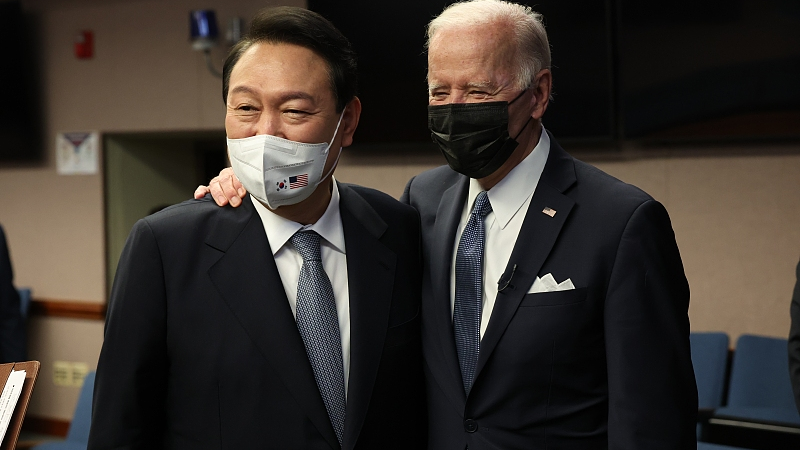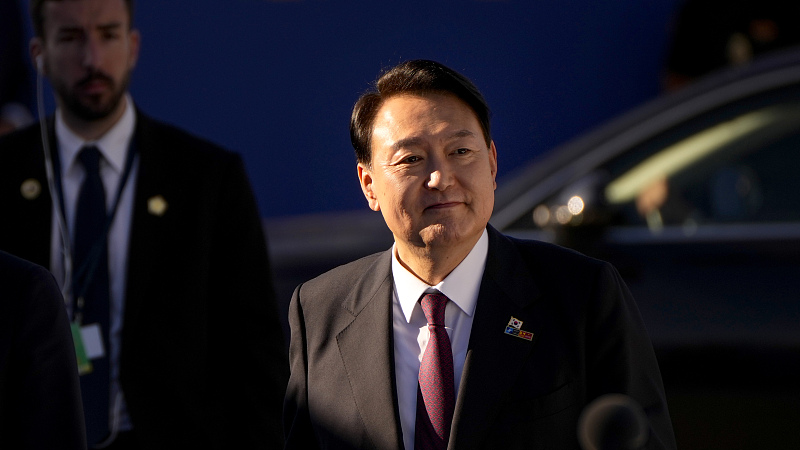
South Korea President Yoon Suk-yeol (L) and U.S. President Joe Biden visit the Korean Air and Space Operations Center at Osan Air Base in Pyeongtaek, South Korea, May 22, 2022. /CFP
South Korea President Yoon Suk-yeol (L) and U.S. President Joe Biden visit the Korean Air and Space Operations Center at Osan Air Base in Pyeongtaek, South Korea, May 22, 2022. /CFP
Editor's note: Abu Naser Al Farabi is a Dhaka-based columnist and analyst focusing on international politics, especially Asian affairs. The article reflects the author's opinions and not necessarily those of CGTN.
The accession of the conservative political figure, Yoon Suk-yeol, into the South Korean presidential office apparently heightened expectations across Washington's policy circle that the sitting administration would take a more pro-U.S. policy stance in line with the U.S.'s disastrous China-containment strategy. Taking the traditional characteristics of the conservative foreign policy and the current president's campaign rhetoric into account, this sort of expectation does have some merits.
But given some structural constraints ingrained within the South Korean societal and political spectrum, such a desire on the part of the U.S. that the current South Korean administration will take foreign policy shift closer to the United States, especially on China, doesn't bear any relation to the reality. Also, such efforts to drag ROK into the wider U.S. strategy to contain China will further complicate the political landscape of the region already fraught with simmering geopolitical tensions.
The U.S.-ROK security alliance has traditionally played a balancing act against the DPRK. But in recent times, it appears that the alliance is being drifted away from its core balancing focus, with the United States striving to reconfigure a once mutually beneficial alliance in line with its self-interest-driven grand strategy – to contain China in the Asia-Pacific.
At the cost of ROK's national interests and regional stability, the United States is exerting widely unwelcome pressure on South Korea to toe its confrontational policy lines against China. These include pressing hard on Seoul to engage itself explicitly in the Taiwan question; a thorough association of South Korea into the Quadrilateral Security Dialogue (Quad); pushing hard on a trilateral military alliance to build military interoperability with the U.S. and Japan; deployment of additional Terminal High Altitude Area Defense (THAAD) batteries, and very recently, the formation of the controversial "CHIP 4" alliance which "sets up semiconductor barriers against the Chinese mainland."
So far, South Korea has kept its regional strategy limited within the Korean Peninsula. But, Washington is now putting more pressure on Seoul to take a greater role in matters well beyond its strategic periphery. For example, in contrast to the majority of Asian nations, South Korea joined the U.S. and Japan in imposing sanctions on Russia and participated for the first time in the recently concluded NATO Madrid summit as a non-NATO member.
Nonetheless, the U.S.'s persistent push on its way to "indulge Seoul in emerging non-inclusive, bloc-like structures of U.S. allies in Asia" and eventually stand it as a "bridgehead to counter China" will meet insurmountable constraints embedded within the very structure of South Korean society and politics.

South Korea President Yoon Suk-yeol arrives for the NATO summit in Madrid, Spain, June 30, 2022. /CFP
South Korea President Yoon Suk-yeol arrives for the NATO summit in Madrid, Spain, June 30, 2022. /CFP
First, until at least now, South Korea has maintained a delicate balance while engaging with both its treaty ally, the U.S., and its largest trading partner China. Any sort of pro-U.S. shift in its foreign policy, be it deliberate or under pressure from the U.S. to its favor, other than balancing between will effectively impair the policy consistency that has reaped tremendous benefits for all parties involved.
Second, China is the largest trading partner of South Korea, with bilateral trade standing now at a staggering $360 billion and investment at around $100 billion. Over a quarter of South Korea's total trade is with China, which is more than its combined trade with Japan and the U.S. More importantly, South Korea is highly dependent on China for critical components like integrated circuits, electric machinery, broadcasting equipment, computers, etc. Any overt South Korean support for the U.S.'s policies against China's core national and security interests will be met with harsh responses from Beijing. And it is the South Korean economy that will bear the brunt as was seen in 2017 with Seoul's controversial decision to deploy the THAAD missile defense system.
Third, with plummeting approval ratings, which according to a Gallup Korea poll fell to the 20 percent range for the first time in the first week of August, and with an opposition-dominated National Assembly, how far could the current president go, having come to power with a wafer-thin victory by 0.73 percent? His proclaimed confrontational policies sparked much skepticism.
Fourth, the South Korean public is invariably against Seoul taking sides with the U.S. in its containment strategy against China. According to a survey conducted by the Institute for Peace and Unification Studies of the Seoul National University in October 2021, nearly 90 percent of South Koreans don't see China as an adversary, strikingly contrary to what the U.S. wants China to be seen. And according to a KINU Unification Survey 2021, which was titled "U.S.-China Conflict & South Korean Public Opinion," the majority of South Koreans supported a balanced policy position in the context of China-American rivalry instead of leaning too heavily toward any particular one.
Finally, it is in the very interest of South Korea's economy and in consonance with the broader public and political consensus to distance itself from being a bridgehead in U.S.'s China-containment strategy. Instead of being used as a wagon in the U.S.'s Cold War parade against China, South Korea should play a role as a bridge and an opportunity to stabilize Washington's relationship with Beijing.
(If you want to contribute and have specific expertise, please contact us at opinions@cgtn.com. Follow @thouse_opinions on Twitter to discover the latest commentaries in the CGTN Opinion Section.)

